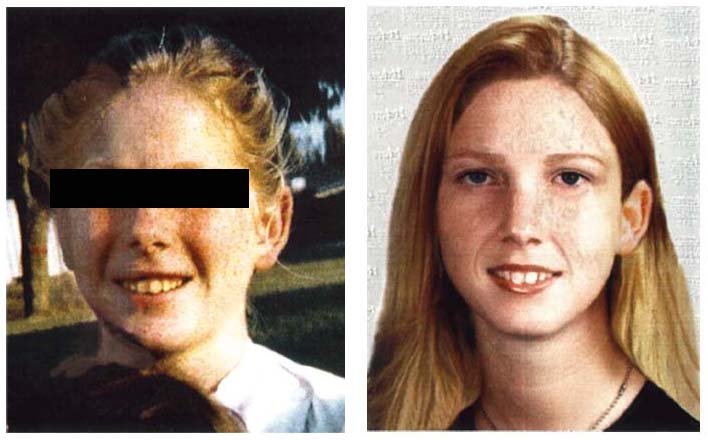Age Progression
Age Progression Forensic Art – Age Progression. Through Forensic Compositing we can create an Age Progression to help investigators solve crimes and find missing people. This service is also available for the general public. Age progression is the process of modifying a photograph of a person to represent the effect of aging on their appearance. Digital image processing is the most common technique today, although sometimes artists' drawings are used.
Kitten Age Progression. 1 Day Old Eyes closed, can not stand. When they are 1-3 days old the umbilical cord is still attached. 3 Days Old Eyes closed, can not stand and their ears are starting to unfold. 6 Days Old Their eyes are starting to open, and they are starting to crawl around. 1 Week Old Their eyes are almost completely. Amazing age progression tool uses your honest responses to answers to determine whether your body is showing more wear and tear than it should be for your calendar age. Health Age and Life Expectancy: This cool calculator is meant to help you figure out your health age. Age progression typically involves an acceleration of the aging process, by magical, scientific, or unexplained methods. This results in graying hair, wrinkles, weight gain, fat distribution around the body, and more. Like weight gain and nerd transformations, age progression can be part of a punishment/humiliation story.
Overview of the (fictional) age progression of Bruce Lee, a famous Asian actor.

Applications
Key features
Interactive inputs
You will get to decide how should Bruce looks when he was young or when he would have got older. It's all up to your creativity to morphing the images.

Two blending modes
There's two blending modes you can choose from: shape or color. The shape blending control the facial structure of the morphing images. The color blending controls the skin and hair texture.
Real-time simulation
The program would render your input in realtime. I manage to do so via a fast image morphoing algorithm.
Exportable results
You got to show your result image by printing it. Now go and get on with it!
Downloads
PDF file explaining the method
Age Progression ZIP file
MCRInstaller v.7.8 (for non-MATLAB user)
- Wikipedia. ' Age Progression. 'Article on September 2007. Retrieved December 04, 2009
- Arivazhagan, S.; Mumtaj, J.; Ganesan, L. 'Non holonomic' 'Face Recognition Using Multi-Resolution Transform,' Conference on Computational Intelligence and Multimedia Applications, 2007. International Conference on , vol.2, no., pp.301-305, 13-15 Dec. 2007}
- Lee D. T., Schachter, B. J,. 'Two algorithms for constructing a Delaunay triangulation,' International Journal of Parallel Programming, Journal on, vol.9, issue 3, pp.219-242, 01 Jun 1980}
- Dyn, N. ; Levin, D.; and Rippa, S.Data Dependent Triangulations for Piecewise Linear Interpolation IMA J Numer Anal 10: 137-154.}
- Trajkovic, M.; Hedley M.; Fast corner detection, Image and Vision Computing, Volume 16, Issue 2, 20 February 1998, Pages 75-87, ISSN 0262-8856, DOI: 10.1016/S0262-8856(97)00056-5
AGE PROGRESSIONS of adults are done in cases of endangered missing adults as well as fugitives, all in the hopes of generating renewed public interest and fresh leads for investigators.
Forensic artists don’t have any special gifts or psychic ability to predict what someone will look like in the future. What we do have is in-depth knowledge of facial anatomy, we’ve studied aging patterns of the face, and we have the artistic ability to illustrate those changes. Barring any new specific information about a person’s appearance, it really comes down to educated guesswork.
To create an age-progressed image, whether by retouching the photo or doing a drawing, an artist follows the same basic protocol. First, we try to get as much information on the person as possible, such as their lifestyle, genetics, occupation, etc. The more information, the better. This is because an outdoorsy and athletic person will likely age much differently than someone who had a sedentary office job or was prone to health problems.
Age Progression Software
Whether hand drawn or produced with the use of Photoshop, age progressions are just one of several possible “looks’ that a person may have when they age. Forensic artists are not psychic, and there is no guarantee that what is produced will look 100%, or even 75% of what the person may look like when apprehended.
But, with a motivated law enforcement team putting the image out there to the public, this can often generate enough interest that people will take a second look, and call in a lead.
CHILD AGE PROGRESSIONS of children are a different story. Needless to say, the aging process for adults is vastly different than that of children, so the method for producing an age-progressed image of a child is different as well. Instead of lifestyle changes, artists must depict the proportional changes of a child’s growth. This requires specialized knowledge, and ideally, specific input from the missing child’s parents and siblings. Many cases of child abductions are a result of custody disputes so this input isn’t always available, but continually updated images of the missing child are a way to help keep the search alive, and in the public’s memory.

Age Progression App
Please note: I do not do age progressions or depictions of the deceased; however, I can highly recommend Phojoe. I have no affiliation with their company, but they do excellent work in this regard.